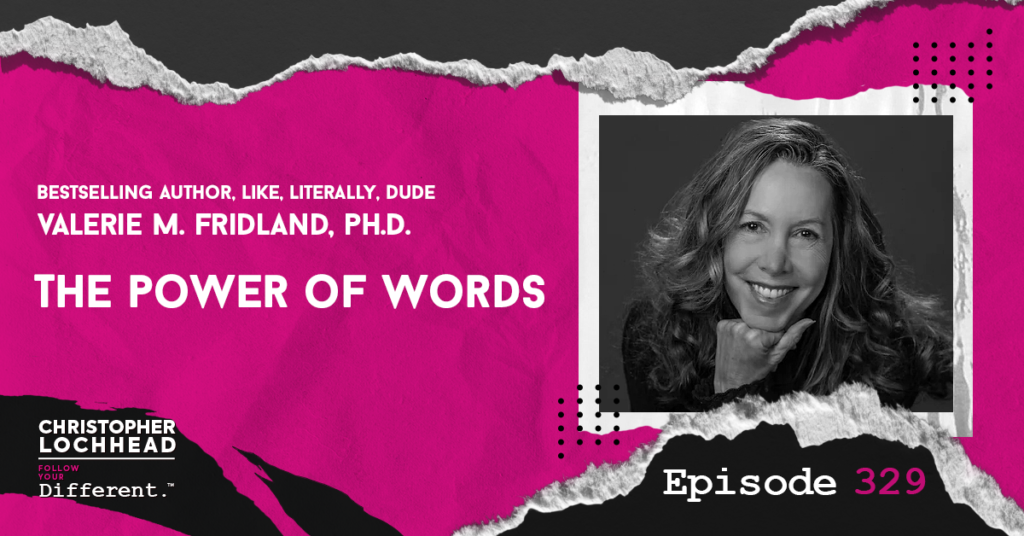329 The Power of Words with Dr. Valerie Fridland, #1 Bestselling Author of “Like, Literally, Dude”

Podcast: Play in new window | Download (Duration: 1:08:03 — 46.7MB) | Embed
Subscribe: Apple Podcasts | Spotify | Pandora | RSS | More
Nothing is more powerful than words. Yet we seldom realize that our most private thoughts and emotions are not actually our own. For we think in terms of languages and images, which we did not invent, but which were given to us by our society. Today, we go deep into the power of words and much more with our guest, Dr. Valerie Fridland.
Dr. Valerie Fridland is a professor of linguistics at the University of Nevada in Reno. She writes a popular language blog on psychology today called Language in the Wild. Her new book is the number one bestseller. It’s called, Like, Literally, Dude, arguing for the good in bad English. So if you love words, thinking, and thinking about words, you’re gonna love Dr. Valerie.
You’re listening to Christopher Lochhead: Follow Your Different. We are the real dialogue podcast for people with a different mind. So get your mind in a different place, and hey ho, let’s go.
Dr. Valerie Fridland on how Language evolves over time
The conversation starts with Christopher asking if the emergence of new phrases that some people dislike is a part of how language changes and develops. Dr. Valerie Fridland explains that language evolution involves a combination of factors, including how our brains and mouths work, societal influences, and the goal of maximizing communication with minimal effort. Language not only conveys information but also communicates social facts and signals about relationships and context.
Dr. Valerie mentions that language naturally tends to become more efficient in terms of pronunciation over time. For instance, sounds that are harder to articulate tend to simplify, such as the evolution of “th” sounds into sounds like “f” or “v.” Despite these natural linguistic changes, people often criticize them as lazy or uneducated.
Christopher shares examples of pronunciation differences he’s noticed over time, like the word “details” and “insurance”. Dr. Valerie explains that these changes often involve shifts in stress patterns, where certain syllables become emphasized while others are de-stressed. This shift in stress patterns can be influenced by various factors, including the influence of other languages or dialects.
The shifting of words due to culture and society
Dr. Valerie and Christopher then continue the discussion about the shift of words due to cultural and contextual changes over time. They explore the evolution of the word “stone” from its Old English origins as “stainaz” to its modern form, which was influenced by contact with Old Norse and Anglo Norman French. This emphasizes how language changes in response to historical interactions and influences.
They also discuss the evolution of the word “partner” and how it reflects changes in societal attitudes towards relationships. Initially associated with business partnerships, “partner” expanded to include romantic or committed relationships, especially within the LGBTQ+ community as social acceptance grew. Younger generations commonly use “partner” to refer to their significant others, regardless of their gender or marital status. Valerie explains that language adapts to describe new concepts or changing social norms, often by repurposing existing words rather than creating entirely new ones.
Dr. Valerie Fridland on Neologism
Neologism refers to the creation of entirely new words, not borrowed from other languages. Christopher initially confuses neologism with someone who invents new words, but Dr. Valerie Fridland clarifies that it involves creating completely new words.
They discuss examples related to language innovation. Christopher mentions how businesses like Starbucks introduce new words or repurpose existing ones to create new categories, as seen with “latte” and “grande.” Valerie explains that these are not neologisms but rather the borrowing or repurposing of words.
The conversation delves into the concept of creating new words through morphological processes like adding suffixes, as seen with “palooza” and “gate.” These processes involve attaching meaningful elements to existing roots, creating new words that build on old word parts.
Christopher provides an example of how he playfully tweaks expressions to make them more accurate, such as saying “to make a long story longer” instead of the common “to make a long story short.” Dr. Valerie describes this as a form of linguistic extravagance, where novelty and unexpected language use attract attention and cognitive focus.
To hear more from Dr. Valerie Fridland and the power of words in our culture and society, download and listen to this episode.
Bio
Valerie M. Fridland, Ph.D.
Sociolinguist, Professor, Author
With a PhD in linguistics, Dr. Valerie Fridland is a Professor and former Director of Graduate Studies in the Department of English at the University of Nevada in Reno. An expert on the relationship between language and society, her work has appeared in numerous academic journals and she is co-author of the book Sociophonetics.
Dr. Valerie also speaks and writes widely for a popular audience. Her language blog, Language in the Wild, appears in Psychology Today and her lecture series, Language and Society, is featured with The Great Courses. Her first book for a popular audience, Like, Literally, Dude: Arguing for the Good in Bad English, is available for pre-order with Viking/Penguin Press. She has appeared as a language expert on a variety of media outlets such as CBS News, NPR and Newsy’s The Why and is regularly featured on podcasts and radio.
Dr. Valerie Fridland lives with her husband and two teenagers in the beautiful Reno/Tahoe area.
Links
Connect with Dr. Valerie Fridland!
Dr. Valerie’s website | LinkedIn | Language in the Wild | Like, Literally, Dude
We hope you enjoyed this episode of Christopher Lochhead: Follow Your Different™! Christopher loves hearing from his listeners. Feel free to email him, connect on Facebook, Twitter, Instagram, and subscribe on iTunes!

